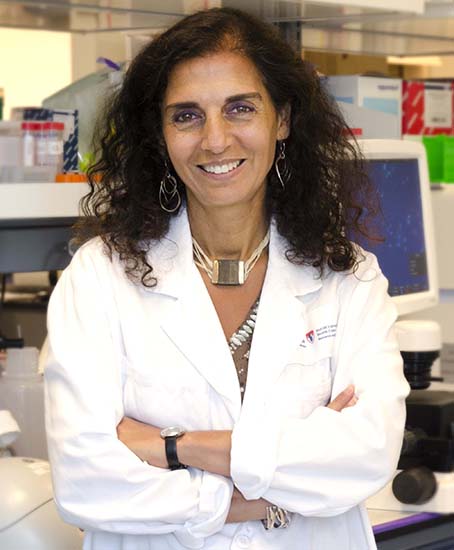The unanticipated early origins of childhood brain cancer

Brain tumours are the leading cause of non-accidental death in children in Canada, but little is known about when these tumours form or how they develop. Researchers from SickKids, the Ontario Institute for Cancer Research (OICR) and the Research Institute of the McGill University Health Centre (RI-MUHC), have recently identified the cells that are thought to give rise to certain brain tumours in children and discovered that these cells first appear in the embryonic stage of a mammal’s development – far earlier than they had expected.
Their findings, published today in Nature, could lead the way to the discovery of better treatments to attack these lethal tumours.
“The brain is extraordinarily complex. These findings are not only important for better understanding brain tumours but they will also allow us to learn more about these cells and how they work, in order to help children with neurodevelopmental delays. What we have accomplished as a team in this study brings hope for patients,” says co-lead of the study, Dr. Nada Jabado, pediatric hemato-oncologist at the Montreal Children’s Hospital of the MUHC and senior scientist at the RI-MUHC and a professor of pediatrics and human genetics at McGill University.

Using mouse models, the research group investigated the different types of normal brain cells and how they developed at various timepoints in the cerebellum of the brain – the most common location for childhood brain tumours to appear. They mapped the lineages of over 30 types of cells and identified normal cells that would later transform into cancerous cells, also known as the cells of origin.
To pinpoint these specific cells, the group relied on single cell sequencing technology, which allows researchers to look at individual cells more clearly than traditional sequencing methods.
“Progress in the development of more effective brain cancer treatments has been hampered in large part by the complex heterogeneity – or the variety of cells – within each tumour,” says Dr. Michael Taylor, pediatric neurosurgeon and senior scientist in developmental and stem cell biology at The Hospital for Sick Children (SickKids) and co-lead of the study. “We recognized that new technologies could allow us to unravel some of this complexity, so we combined our expertise with McGill and OICR to approach this problem together.”
In their investigation, the cells of origin were observed much earlier in fetal development than one would expect, says Taylor, who is also a Professor in the Departments of Surgery and Laboratory Medicine and Pathology at the University of Toronto and Co-lead of OICR’s Brain Cancer Translational Research Institute.
“Our data show that in some cases, these tumours arise from cell populations and events that would occur in humans at six weeks in utero,” says Dr. Lincoln Stein, Head of Adaptive Oncology at OICR and co-lead of the study. “This means that the brain tumours may be starting long before they show in clinic, even before a woman may know she is pregnant.”
With this knowledge, researchers can now study the differences between the development of normal, healthy cells and the cells that will eventually give rise to cancerous cells.
This work was made possible through the 2017 Large-Scale Applied Research Project Competition Genomics and Precision Health supported by main funding agencies Génome Québec, the Canadian Institutes of Health Research (CIHR) and Genome Canada, as well as the Ontario Research Fund, the SickKids Foundation and the Montreal Children’s Hospital Foundation. The work was also supported by the Ontario Institute for Cancer Research through funding provided by the Government of Ontario and the Stand Up To Cancer (SU2C) St. Baldrick’s Pediatric Dream Team Translational Research Grant (SU2C-AACR-DT1113) and SU2C Canada Cancer Stem Cell Dream Team Research Funding (SU2C-AACR-DT-19-15) provided by the Government of Canada through Genome Canada and the Canadian Institutes of Health Research, with supplementary support from the Ontario Institute for Cancer Research through funding provided by the Government of Ontario.
About The Hospital for Sick Children (SickKids)
The Hospital for Sick Children (SickKids) is recognized as one of the world’s foremost paediatric health-care institutions and is Canada’s leading centre dedicated to advancing children’s health through the integration of patient care, research and education. Founded in 1875 and affiliated with the University of Toronto, SickKids is one of Canada’s most research-intensive hospitals and has generated discoveries that have helped children globally. Its mission is to provide the best in complex and specialized family-centred care; pioneer scientific and clinical advancements; share expertise; foster an academic environment that nurtures health-care professionals; and champion an accessible, comprehensive and sustainable child health system. SickKids is a founding member of Kids Health Alliance, a network of partners working to create a high quality, consistent and coordinated approach to pediatric health care that is centred around children, youth and their families. SickKids is proud of its vision for Healthier Children. A Better World.
About the Ontario Institute for Cancer Research (OICR)
OICR is a collaborative, not-for-profit research institute funded by the Government of Ontario. We conduct and enable high-impact translational cancer research to accelerate the development of discoveries for patients around the world while maximizing the economic benefit of this research for the people of Ontario. For more information visit www.oicr.on.ca.
About the Research Institute of the MUHC
The Research Institute of the McGill University Health Centre (RI-MUHC) is a world-renowned biomedical and healthcare research centre. The Institute, which is affiliated with the Faculty of Medicine of McGill University, is the research arm of the McGill University Health Centre (MUHC) – an academic health centre located in Montreal, Canada, that has a mandate to focus on complex care within its community. The RI-MUHC supports over 420 researchers and close to 1,200 research trainees devoted to a broad spectrum of fundamental, clinical and health outcomes research at the Glen and the Montreal General Hospital sites of the MUHC. Its research facilities offer a dynamic multidisciplinary environment that fosters collaboration and leverages discovery aimed at improving the health of individual patients across their lifespan. The RI-MUHC is supported in part by the Fonds de recherche du Québec – Santé (FRQS). rimuhc.ca
Media contacts
Julie Robert
McGill University Health Centre
514-934-1934 ext. 71381
[email protected]